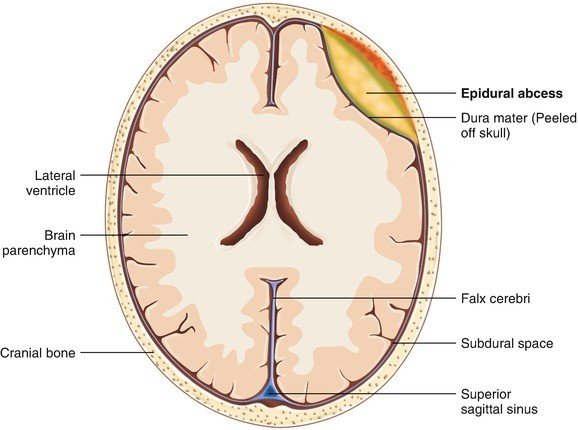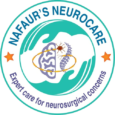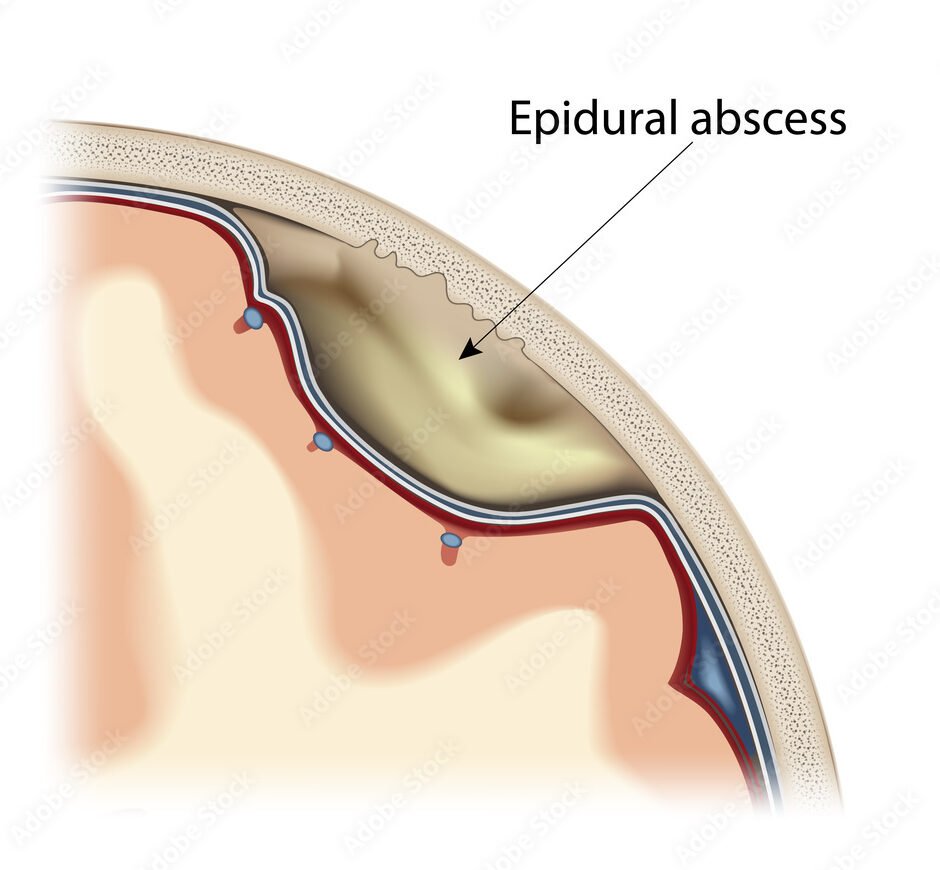Epidural Abscess
Epidural Abscess
A cerebral epidural abscess is a localized collection of pus between the dura mater and the skull in the brain. In children, it often develops as a complication of ear infections, sinusitis, skull fractures, or post-surgical infections. If not diagnosed and treated in time, it can lead to devastating complications, including brain herniation, neurological deficits, seizures, or death. In Bangladesh, delayed diagnosis, inadequate antibiotic treatment, and lack of access to pediatric neurosurgical expertise often contribute to poor outcomes. Dr. Md. Nafaur Rahman, a pioneer in pediatric neurosurgical infections, specializes in the early detection and surgical treatment of brain abscesses, including epidural collections in children. 🌍 Pediatric Cerebral Epidural Abscess in Bangladesh: A Serious Yet Treatable Condition Due to high rates of untreated ENT infections, trauma, and poor sanitation, children in Bangladesh are at increased risk of intracranial infections, including epidural abscesses. These infections are especially common in rural and peri-urban areas where awareness, imaging access, and follow-up care are limited. Dr. Md. Nafaur Rahman emphasizes that early referral and surgical drainage, combined with the right antibiotics, can save lives and prevent long-term brain damage in children. ⚠️ Symptoms of Cerebral Epidural Abscess in Children The symptoms of a pediatric cerebral epidural abscess can vary depending on the age of the child and the location of the infection, but commonly include: 🌡️ Persistent high-grade fever 🤕 Severe headache, especially localized 👁️ Swelling near the forehead or scalp ⚡ Seizures or convulsions 😵 Drowsiness, irritability, or confusion 🧠 Signs of raised intracranial pressure (vomiting, bulging fontanelle in infants) 🤢 Nausea, photophobia 🧍♂️ Focal neurological signs – weakness, vision changes “When a child with sinusitis or head trauma presents with sudden neurological symptoms, suspect an epidural abscess.” — Dr. Md. Nafaur Rahman 🧬 Common Causes of Cerebral Epidural Abscess in Bangladeshi Children Untreated or partially treated sinusitis or otitis media Skull osteomyelitis or bone infections Penetrating head trauma or compound skull fractures Post-neurosurgical wound infections Hematogenous spread from infections elsewhere (lungs, teeth) Immunocompromised states (malnutrition, tuberculosis, congenital immune disorders) 🧪 Diagnosis of Pediatric Epidural Abscess At NINS and Bangladesh Paediatric Neurocare Centre, Dr. Nafaur Rahman ensures accurate diagnosis using advanced imaging and clinical protocols: 🧲 MRI Brain with contrast – Gold standard to identify the abscess location, extent, and relation to sinuses or skull 📸 CT Scan – Helpful in emergency settings to detect air-fluid levels, bone erosion 🩸 Blood culture – To identify causative bacteria or fungi 🧪 CBC, ESR, CRP – Inflammatory markers 💉 Lumbar puncture – Usually avoided unless abscess rupture is ruled out 🔬 Pus culture and sensitivity – Obtained during surgery to guide antibiotics 🛠️ Treatment of Pediatric Cerebral Epidural Abscess Prompt and combined medical and surgical management is critical for survival and neurological preservation. 🧠 Neurosurgical Management: Craniotomy or burr hole drainage – To evacuate the abscess and decompress the brain Endoscopic sinus surgery (if ENT origin) – Performed in collaboration with ENT specialists Removal of infected bone or foreign body – In trauma or post-surgical infections Repair of dural leaks or skull defects – To prevent recurrence 💊 Medical Management: High-dose intravenous antibiotics for 4–6 weeks Empirical broad-spectrum coverage, then tailored by culture Steroids in selected cases to reduce brain swelling Antiepileptic drugs for seizure prevention or control Nutritional support to aid immune recovery 🔁 Long-Term Follow-Up and Rehabilitation 🧑⚕️ Regular neuroimaging (MRI) to ensure resolution 🧒 Developmental screening for cognitive or motor delays 🧠 Speech therapy if there are residual neurological deficits 📚 School reintegration and academic support 🤝 Family counseling and infection prevention education 🚨 Complications if Left Untreated If not treated promptly, a cerebral epidural abscess in a child can lead to: 💣 Brain herniation and death ⚡ Chronic seizures or epilepsy 🧠 Permanent neurological deficits – speech loss, vision issues, paralysis 🦠 Spread to subdural or brain parenchyma (brain abscess) 📉 Cognitive decline and school dropout 👨⚕️ Why Trust Dr. Md. Nafaur Rahman? 🧠 Expert in managing complex pediatric CNS infections surgically 🏥 Practices at Bangladesh’s national neuroscience center (NINS) 🧬 Combines neurosurgical precision with infection control 🤝 Works in a multidisciplinary team (ENT, infectious disease, pediatrics) 🌟 Committed to saving lives through early intervention and awareness 📞 Contact Dr. Nafaur Rahman for Pediatric Brain Infection Care Dr. Md. Nafaur Rahman Assistant Professor, Pediatric Neurosurgery, NINS Chief Consultant, Bangladesh Paediatric Neurocare Centre 📱 For Serial/Appointment: 📞 01912988182 | 📞 01607033535 🌐 Website: www.neurosurgeonnafaur.com





